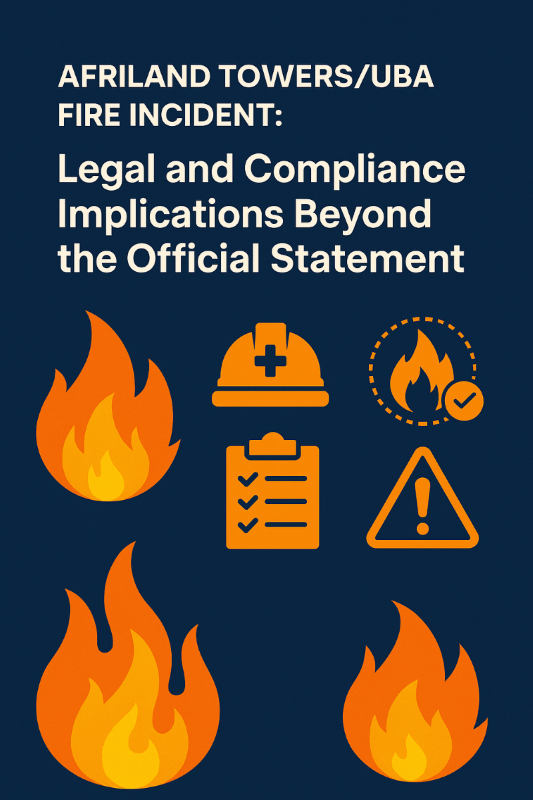The recent fire outbreak at Afriland Towers – housing a UBA branch – on Broad Street, adjacent to the corporate commercial nerve of Lagos, raises urgent questions on health, safety, and legal compliance in Nigerian workplaces. While UBA (United Bank of Africa) issued a statement that the fire did not affect its Marina head office and assured stakeholders of safety, the message leaves gaps when weighed against reasonable practices in workplace safety and corporate responsibility.
What UBA’s Stated
UBA’s official statement stressed that the fire occurred in the inverter room at Afriland Towers, that employees and customers were evacuated, and the well-being of staff, customers, and visitors was their priority.
Such reassurance is expected in a crisis; however, from a legal, regulatory, and compliance perspective, the statement is notably silent on crucial issues.
What UBA Statement Did Not Address
Health, Safety and Environment (HSE) Compliance
We know that global best practice requires disclosure (even at a preliminary stage) on whether fire alarms, sprinklers, and emergency exit at the UBA branch on broad street, Lagos, functioned as designed.
Stakeholders expect transparency on how UBA complied with fire safety codes under Lagos State Building Control and Fire Service regulations. Silence here creates reputational and legal exposure.
Occupiers’ Liability
Under common law and Nigeria’s statutory frameworks, an occupier owes a duty of care to employees, tenants, and visitors.
Beyond evacuation, UBA did not mention of facility maintenance logs, building safety reports, or whether Afriland Properties (as building managers) had conducted recent inspections.
UBA’s failure to disclose those specific details could trigger claims in tort or regulatory inquiries.
Workplace Injury and Employee Rights
Reports of casualties raise the issue of compensation under the Employees’ Compensation Act (ECA) 2010 and potential liabilities under Nigeria’s Factories Act.
UBA’s statement omited any reference to support for injured staff, families of the deceased, or access to medical/psychological care. Crucial aspects of employer responsibility.
Globally, employers issue immediate commitments to fund medical care, provide counseling, and activate workplace injury insurance. However, UBA’s silence is deafening on these employee wellness issues.
Psychological and Mental Health Support
Fire incidents carry trauma for survivors and their families. Video circulating on social media highlighted inexperienced staff or uncoordinated customers who acted impulsively with consequent personal injuries or possible deaths.
Globa best practice in crisis management and communication includes providing grief counseling, stress management resources, and employee assistance programmes.
UBA’s communication was silent on these humane, but legally and reputationally significant, obligations.
Crisis Management and Transparency
Internationally, crisis statements balance reassurance with openness. Acknowledging what is known, what is under investigation, and what will be disclosed.
By contrast, UBA’s statement reads more like a defensive clarification than a transparent action plan. Investors, regulators, and employees expect more.
Comparing with Global Standards
In similar incidents, employers in US and the UK disclose whether OSHA (US’s Occupational Safety and Health Administration) or HSE (the UK’s Health and Safety Executive) were notified, release initial compliance findings, and announce independent investigations.
Both Nigeria’s SEC (Security and Exchange Commission) Code and international ESG (Environmental, Social, and Governance) standards emphasise timely, accurate, and comprehensive disclosure of material incidents affecting employees and operations.
Leading institutions immediately announce employees’ support packages, counseling services, and structured compensation pathways.
Legal and Statutory Exposures
Negligence and Tort Claims – Failure to maintain safe premises, inadequate fire safety equipment, or ignored warnings can ground civil claims.
Regulatory Violations – Breaches of Lagos State Fire Safety Regulations, building codes, or NDPR (if employee/customer data was compromised in the fire).
Employee Compensation Act and Factories Act – Families of deceased or injured employees have statutory rights regardless of employer intent.
Occupiers’ Liability – Afriland Properties, as building manager, may be jointly liable with UBA for lapses in safety management.
What UBA and Other Institutions Should Do Now
- Immediate Disclosure: Release verified information on fire safety compliance, maintenance history, and audit reports.
- Independent Audit: Commission an independent HSE and compliance review, and make findings public.
- Employee & Family Support: Announce structured compensation, medical assistance, and counseling for affected employees and families.
- Regulatory Engagement: Publicly confirm engagement with Lagos State Fire Service, Building Control, and Labour authorities.
- Future Assurance: Commit to transparent remedial actions—regular fire drills, employee training, maintenance reporting—to restore trust.
Conclusion
The Afriland Towers/UBA fire incident is a litmus test for how Nigerian corporates handle crises. Official statements must go beyond reassurance.
Any such statement should demonstrate compliance, transparency, and care for human life. In its absence, questions on liability, statutory breach, and reputational responsibility will only grow louder.
At SRJ Legal, we continue to advocate for higher workplace safety standards, occupiers’ liability awareness, and corporate crisis management practices that meet global benchmarks. This is not just a matter of law. It is a matter of life, trust, and corporate conscience.

